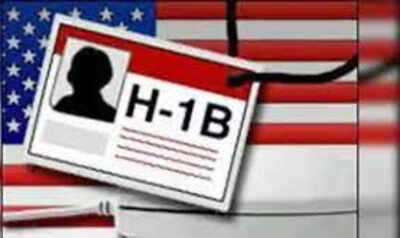Top Searches
- News
- World News
- US News
- Multiple registration for a single H-1B worker by different ‘employers’ challenged in a lawsuit
Multiple registration for a single H-1B worker by different ‘employers’ challenged in a lawsuit

MUMBAI: A group of 510 foreign nationals, including Indians, who were not selected in the recently concluded H-1B cap visa lottery have filed a lawsuit. They have challenged the existing procedure, which enables multiple registrations to be filed for the same individual, which in turn gives him or her a better chance of being selected in the lottery.
In 2019, US Citizenship and Immigration Services (USCIS) introduced the current cap registration process. Sponsoring employers are required to electronically register the beneficiaries (employees whom they wish to hire under the H-1B route). H-1B cap applications are then required to be filed only for those beneficiaries selected in the lottery process.
The annual quota under the H-1B cap program is 85,000 (which includes 20,000 for those having an advanced degree from the US, known as the Masters cap). The demand for H-1B visas far exceeds this quota, thus random selection – known as the lottery system has been used for the past several years.
The lawsuit points out that the cap registration rules allow those individuals with multiple registrations to gain an unfair advantage over individuals with only one registration. It refers to various fraudulent practises that exist.
“The rules and regulations regarding the cap registration process currently permit foreign nationals to have a limitless number of registrations submitted on their behalf by multiple employers. This has led to an entire industry of so-called ‘H-1B consultancies’ and phony employers who have exploited the flawed cap registration rules by charging prospective workers to file multiple registrations on their behalf, even when there is no bona fide job offer from a qualifying employer,” states the lawsuit petition filed with the US district court of Columbia.
“Because the current selection process is based on the number of registrations, rather than on an individual basis, individuals with multiple registrations have considerably higher probabilities of being selected. On the other hand, the probabilities dwindle significantly for individuals with only one registration,” it adds.
The plaintiffs point out that they saw their probabilities of being selected in the FY 2022 H-1B lottery significantly reduced due to this rampant fraud and abuse. Each of these plaintiffs had a bonafide job offer with a US employer, many were already working with their sponsoring employer under the Optional Practical Training (OPT) program, meant for international students and were hoping to transit to an H-1B visa to continue with the same employer.
The current procedure is contrary to the Immigration and Nationality Act (INA) because the cap registration rules allow one foreigner with several registrations multiple opportunities to obtain an H-1B visa. The cap registration rules promulgated by Department of Homeland Security (DHS) and implemented by USCIS have led to H-1B applicants being selected in a manner not contemplated by the Act. Therefore, because the cap registration rules violate the INA, they must be set aside, is the plea put forth by the plaintiffs.
In 2019, US Citizenship and Immigration Services (USCIS) introduced the current cap registration process. Sponsoring employers are required to electronically register the beneficiaries (employees whom they wish to hire under the H-1B route). H-1B cap applications are then required to be filed only for those beneficiaries selected in the lottery process.
The annual quota under the H-1B cap program is 85,000 (which includes 20,000 for those having an advanced degree from the US, known as the Masters cap). The demand for H-1B visas far exceeds this quota, thus random selection – known as the lottery system has been used for the past several years.
The lawsuit points out that the cap registration rules allow those individuals with multiple registrations to gain an unfair advantage over individuals with only one registration. It refers to various fraudulent practises that exist.
“The rules and regulations regarding the cap registration process currently permit foreign nationals to have a limitless number of registrations submitted on their behalf by multiple employers. This has led to an entire industry of so-called ‘H-1B consultancies’ and phony employers who have exploited the flawed cap registration rules by charging prospective workers to file multiple registrations on their behalf, even when there is no bona fide job offer from a qualifying employer,” states the lawsuit petition filed with the US district court of Columbia.
“Because the current selection process is based on the number of registrations, rather than on an individual basis, individuals with multiple registrations have considerably higher probabilities of being selected. On the other hand, the probabilities dwindle significantly for individuals with only one registration,” it adds.
The plaintiffs point out that they saw their probabilities of being selected in the FY 2022 H-1B lottery significantly reduced due to this rampant fraud and abuse. Each of these plaintiffs had a bonafide job offer with a US employer, many were already working with their sponsoring employer under the Optional Practical Training (OPT) program, meant for international students and were hoping to transit to an H-1B visa to continue with the same employer.
The current procedure is contrary to the Immigration and Nationality Act (INA) because the cap registration rules allow one foreigner with several registrations multiple opportunities to obtain an H-1B visa. The cap registration rules promulgated by Department of Homeland Security (DHS) and implemented by USCIS have led to H-1B applicants being selected in a manner not contemplated by the Act. Therefore, because the cap registration rules violate the INA, they must be set aside, is the plea put forth by the plaintiffs.
FacebookTwitterLinkedinEMail
Start a Conversation
end of article
